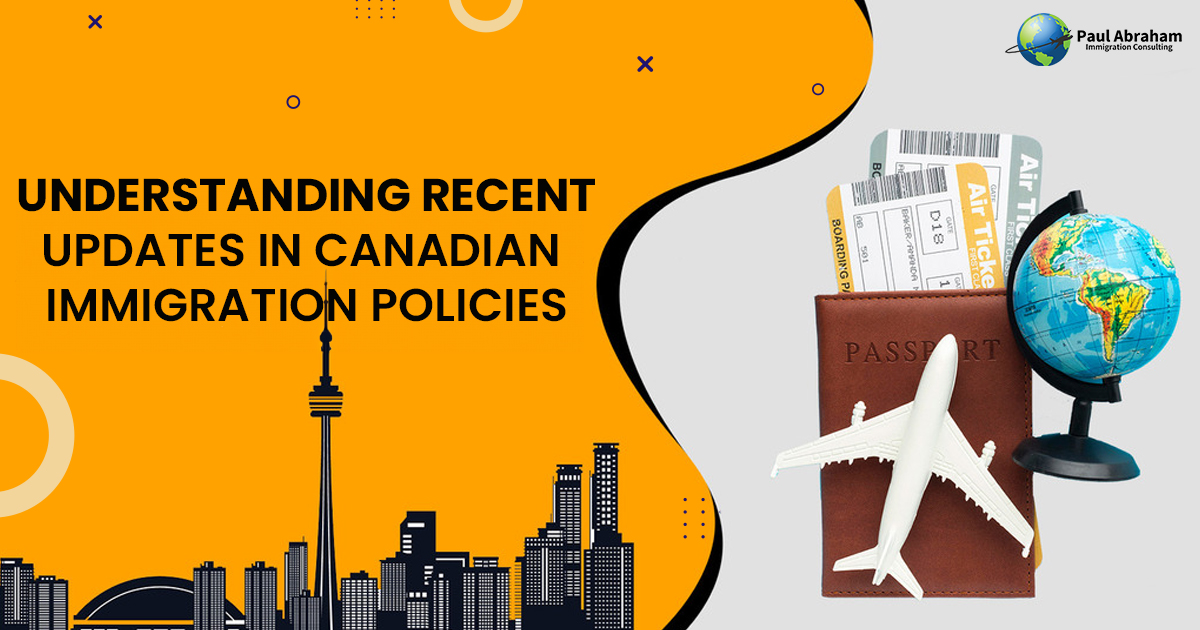Understanding Recent Updates in Canadian Immigration Policies: Essential Information

Last Updated On : March 16 , 2024
In December, the Canadian Minister of Citizenship and Immigration unveiled significant adjustments set to reshape the framework for temporary students and workers seeking entry into Canada. These revisions, coupled with recent declarations, carry substantial ramifications, particularly for international students and employers, within the Canadian immigration system and policies.
Below is a summary of the key highlights and their potential effects on your immigration aspirations.
Evolution of the Express Entry System: What to Expect in 2024
Building upon the advancements of 2023, the IRCC is poised to continue its category-based Express Entry draws in 2024. The primary objective remains addressing critical labour shortages and demographic requirements.
While emphasis was placed on French language proficiency and specific industry experience in 2023, the focus categories are under review, potentially opening avenues for new immigrant groups.
This shift targets candidates proficient in French and professionals in healthcare, science, technology, and mathematics. Keep an eye out for the new categories introduced in the 2024-2026 Immigration Plan, as they will welcome fresh cohorts of newcomers eligible for category-based Express Entry draws.
For International Students
- Study Permits and Caps:
- Canadian immigration policies introduce a temporary cap on study permit approvals in 2024 and 2025.
- Approximately 360,000 study permits are slated for approval in 2024, reflecting a 35% decrease from the preceding year.
- Renewals and current study permit holders are exempt from this cap, remaining unaffected.
- Applications for master's and doctoral degree programs, as well as elementary and secondary education, are not subject to this cap under Canadian immigration process laws.
- Updates in the Application Procedure:
Immigration, Refugees, and Citizenship Canada (IRCC) will now allocate a cap per province/territory, followed by allocations per Designated Learning Institution (DLI). Starting from January 22, 2024, all study permit applications sent to IRCC require an attestation letter from a province or territory. Provinces and territories have been assigned the responsibility of creating procedures for issuing these attestation letters to students by March 31, 2024.
- Amendments to the Post-Graduation Work Permit (PGWP) Scheme:
Starting September 1, 2024, changes to the PGWP program will affect specific student categories:
- Exclusion of students enrolled in study programs governed by curriculum licensing agreements.
- Ineligibility for students attending private colleges authorized to offer associated public college curricula.
Moreover, restrictions will be imposed on open work permits for spouses of international students, especially those enrolled in master's and doctoral programs.
Additionally, graduates from master's and other short graduate-level programs will qualify for extended Post-Graduation Work Permit (PGWP) durations, enabling a 3-year work permit under the Canadian immigration system. These updates are pertinent to Canadian residency application processes.
For Temporary Foreign Workers:
If you're considering applying as a temporary foreign worker, it's advisable to submit your application promptly to prepare for any forthcoming alterations.
Employers intending to recruit international workers should proceed with their applications without delay to mitigate the impact of potential future changes.
Take Action Now: Importance of Acting Promptly
For individuals considering applying as international students or temporary foreign workers, it's crucial to act swiftly. With anticipated adjustments to Canadian new immigration policy, taking timely action is essential to adapt to the changing immigration scenario effectively.
Increase in Cost of Living Requirement for International Students Applying for Canadian Residency
The Immigration, Refugees, and Citizenship Canada (IRCC) have revealed a rise in the cost-of-living prerequisite for applicants seeking Canadian Residency, commencing January 1, 2024.
Canadian Immigration Minister Marc Miller disclosed on December 7, 2023, that the updated cost-of-living requirement for a sole study permit applicant will stand at 20,635, alongside first-year tuition and travel expenditures. This alteration impacts the Canada Immigration Process for prospective residents.
Canadian Immigration Policy Updates Impacting International Students
The Canadian Immigration Minister has announced revisions to three temporary policies affecting international students:
- Initially, the extension of the waiver on the 20-hour-per-week off-campus work limit until April 30, 2024, provides increased flexibility for students and applicants, aligning with Canadian immigration policy.
- Secondly, the ongoing facilitative measure permitting online study time to contribute towards a post-graduation work permit remains applicable for students commencing their programs before September 1, 2024, enhancing Canadian immigration eligibility.
- Lastly, the temporary policy granting an additional 18-month work permit to post-graduation work permit holders, addressing pandemic-induced labour market disruptions will cease to be extended beyond December 31, 2023.
Why Choose Paul Abraham Immigration Consulting (PAIC)?
Paul Abraham Immigration Consulting (PAIC) offers a compelling choice for individuals seeking assistance with Canadian immigration. With over 30 years of experience, our seasoned consultants are dedicated to helping you achieve your Canadian residency goals. Here's why you should choose PAIC:
- Expert Guidance: Our consultants possess extensive knowledge of Canadian immigration laws and policies.
- Tailored Solutions: We create customized strategies to meet your specific immigration requirements and objectives.
- Comprehensive Support: From initial consultations to application processing and ongoing assistance, we provide full support at every stage of the process.
- Proactive Approach: We stay informed about changes in Canadian immigration policies, ensuring a smooth and stress-free immigration experience for our clients.
Conclusion
In brief, recent revisions in Canadian immigration regulations carry substantial implications for international students, temporary workers, and employers. Vital alterations encompass study permit caps, updates in application procedures, and modifications to the PGWP scheme.
Responding promptly is imperative amidst evolving policies. With PAIC's proficient guidance and bespoke solutions, maneuvering through these changes becomes more seamless, guaranteeing a successful immigration journey within the Canadian immigration policy and system.
